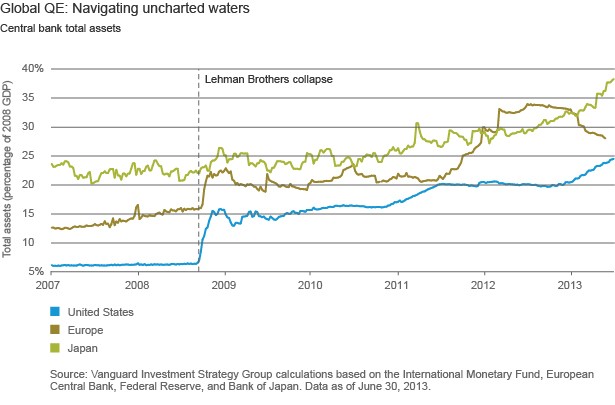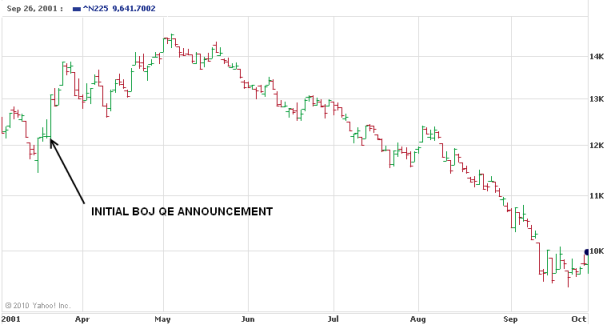What Quantitative Easing Did for Japan and the United Kingdom
Post on: 16 Март, 2015 No Comment

The Federal Reserve has increased its balance sheet significantly through quantitative easing. but I still continue to question its effectiveness. Quantitative easing hasn’t done much for the U.S. economy except: 1) make the banks richer; and 2) rally the stock market, which is good for Wall Street. Quantitative easing has not helped the working poor in this country; nor has it helped the great majority of our citizens.
We need to look at other nations that have already implemented quantitative easing and that have failed at it, such as Japan or the United Kingdom.
Similar to the Federal Reserve, the central bank of Japan has promised to print an unlimited amount of Japanese yen to boost its economic growth and to promote export. Unfortunately, the effects of this are unseen in the economy. As a matter of fact, things have just turned the other way. The trade gap for the Japanese economy for 2012 was $78.27 billion, and exports have been falling for seven consecutive months. (Source: Reuters, January 24, 2013.) Meanwhile, the Japanese yen has fallen in value against other major currencies in the global economy.
Likewise, the Bank of England took the route of quantitative easing. The result? The U.K.’s economy contracted in the fourth quarter of 2012. The central bank of England introduced quantitative easing in March 2009 to boost economic growth, and since then, the Bank of England has printed 375 billion pounds worth of paper currency it exchanged for government debt. (Source: Bank of England web site, last accessed February 4, 2013.)
When I see these nations struggling to spur economic growth through printing paper money, I become more skeptical about further quantitative easing by the Federal Reserve. We are becoming similar to these countries. Our dollar has declined in value against other world currencies, and our economy contracted in the fourth quarter of 2012.
The economic conditions for consumers in the U.S. economy are very poor. Bottom line: they don’t have excess money to spend, and they are worried about their financial future. Quantitative easing isn’t helping them, as they continue to suffer.
Special: An Important Message from Michael Lombardi:
I’ve identified six time-proven indicators that now all point to a stock market crash in 2015. You can see my latest video, Six Time-Proven Indicators Now All Pointing to a 2015 Stock Market Crash, which spells out why we’re headed for a crash and what you can do to protect yourself and even profit from it, when you click here now.

I stand by my belief that if quantitative easing didn’t work for countries like Japan and the United Kingdom, chances of it working here anytime soon are very slim to none. Don’t get fixated on the performance of the stock market, dear reader; it is running on hopes.
Where the Market Stands; Where It’s Headed:
For the stock market, we are at the top or very close to it.
What He Said:
“You’ve been reading my articles over the past few months and have seen how negative I’ve become on the U.S. economy. Particularly, I believe it’s the ramifications of the faltering housing sector that are being underestimated by economists. A recession doesn’t take much to happen. It’s disappointing more hasn’t been written on the popular financial sites and in the newspapers about the real threat of a recession happening in 2007. I want my readers to be fully aware of my economic opinion: I wouldn’t be surprised to see the U.S. economy in a recession sometime in 2007. In fact, I expect it.” Michael Lombardi in Profit Confidential. November 13, 2006. Michael was one of the first to predict a U.S. recession, long before Wall Street analysts and economists even thought it a possibility.














